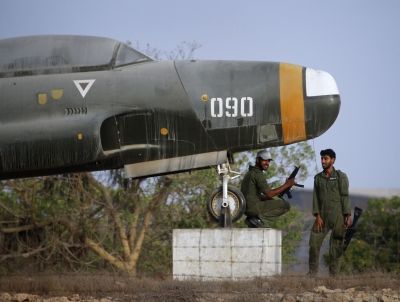 Providing military assistance in the hope that it will change Pakistan’s worldview is wrong, says erstwhile ambassador to the United States Husain Haqqani
Providing military assistance in the hope that it will change Pakistan’s worldview is wrong, says erstwhile ambassador to the United States Husain Haqqani
The United States has been an enabler of Pakistan’s domestic dysfunctional obsession to acquire military parity with India by continuing to provide Islamabad with sophisticated weapons systems, Pakistan’s erstwhile ambassador to the United States Husain Haqqani has said.
Speaking at the launch of his new book, Magnificent Delusions: Pakistan, the United States, and an Epic History of Misunderstanding, at the Hudson Institute in Washington, DC, where he is a senior fellow, Haqqani, argued that Washington’s delusion was that it could wean Islamabad away from this addiction by providing it with military assistance but it only makes the situation worse. It only whets Pakistan’s insatiable appetite more, he said. “That is the psyche, which has been fed over time, and the United States has been an enabler in that.”
Haqqani asserted that providing Pakistan with military assistance “in the hope that it will change Pakistan’s worldview is wrong”. He bemoaned that Pakistan even after acquiring nuclear weapons capability that should have shorn the country of its insecurities and make it feel that it “could destroy who ever was trying to destroy us, Pakistan still did not move away from a huge conventional outlay on the military and the militarist militant approach. That Kashmir, the prize as Pakistan saw it, still remained a problem.”
Haqqani said, Pakistan’s delusion continued to be that it could count on US support forever. And that standing on Washington’s shoulders “Pakistan will acquire that parity with India and that using jihadis as proxies, will be useful for increasing Pakistan’s political, military and strategic weight in the region.”
Later, in an interaction with a couple of journalists, the former envoy, now virtually persona non grata in the country of his birth with credible threats to his life from the Pakistan army and the Inter-Services Intelligence, asserted, “Pakistan cannot forever live as a nation that takes arms from America to confront India. At some point, we have to have a good relationship with our neighbors and an economically-based relationship with a country like the United States.”
“Right now, the US-Pakistani relationship is mostly about aid and arms. It should be about trade and investment. General Electric and General Motors, should matter more than General Dempsey and General Kayani,” he said. Haqqani, who was envoy to Washington from 2008 to 2011 before the ‘memo-gate’ controversy led to his firing, observed that not only was the US-Pakistan relationship a “transactional relationship”, it was a “flawed transactional relationship”.
He warned that if the hardliners in Pakistan “gain further momentum and take over the state completely, Pakistan will have to reconcile to becoming an Iran without oil and that is not easy.”
Haqqani also castigated the Pakistani leadership over the years, pointing to their hypocrisy and alleged, “The Pakistani public has never been told the truth about US-Pakistan relations because successive Pakistani leaders thought that given Pakistan’s relative asymmetry of size with the United States, it would be advantageous to tell the Americans that, ‘Look, our people are against you and I am the only thing that stands between these hostile to America population and United States interests’.”
“And, so, it was always in the interests of Pakistan’s successive leaders to be hostile toward America in public,” while in private it was exactly the opposite. Haqqani argued, “There is a problem in doing that -- you are turning public opinion more and more negative, hoping to use it to your private advantage. But what happens when the public opinion has become
so hostile that the things you promise in private, you become unable to deliver.”
He reiterated that the Pakistani people felt that they have been let down. “It’s not so much because of how America acted toward Pakistan and vice versa, it’s because the Pakistani public was never told the truth.”
Haqqani said that while he was ambassador he tried valiantly to “serve as a bridge and to explain to my Pakistani compatriots some of the mistaken arguments they were offering.” But, acknowledged to peals of laughter, “Now it turns out that it was perhaps a mistake,” which cost him his job. “Never try to correct the mistakes of your own side.”
Haqqani predicted, “I don’t think any of my successors as ambassadors will do that after what I’ve gone through because saying that means you are going to be labeled an American agent.” He also ridiculed the contention of some quarters of Pakistan, where the India-centric paranoia was so manifest that they are convinced that the neighbour to the east wants to absorb it.
“So, Pakistan needs to get over this belief that everybody is out to get us. We need to be self-confident; a nation with nuclear weapons shouldn’t behave like a guy who keeps buying guns because he says he needs to defend his family and then stays up all night because he’s a afraid somebody will come and steal his guns.”
Haqqani didn’t give much credence that this would change anytime soon, and pointed out that when General Kayani visited the US four times during his tenure as ambassador, the army chief of staff had no qualms about reiterating that India was Pakistan’s existential threat and that Pakistan was indeed ‘India-centric.’
Image: Pak military personnel keep guard under an aircraft displayed at the Mehran naval aviation base
Photograph: Athar Hussain/Reuters









